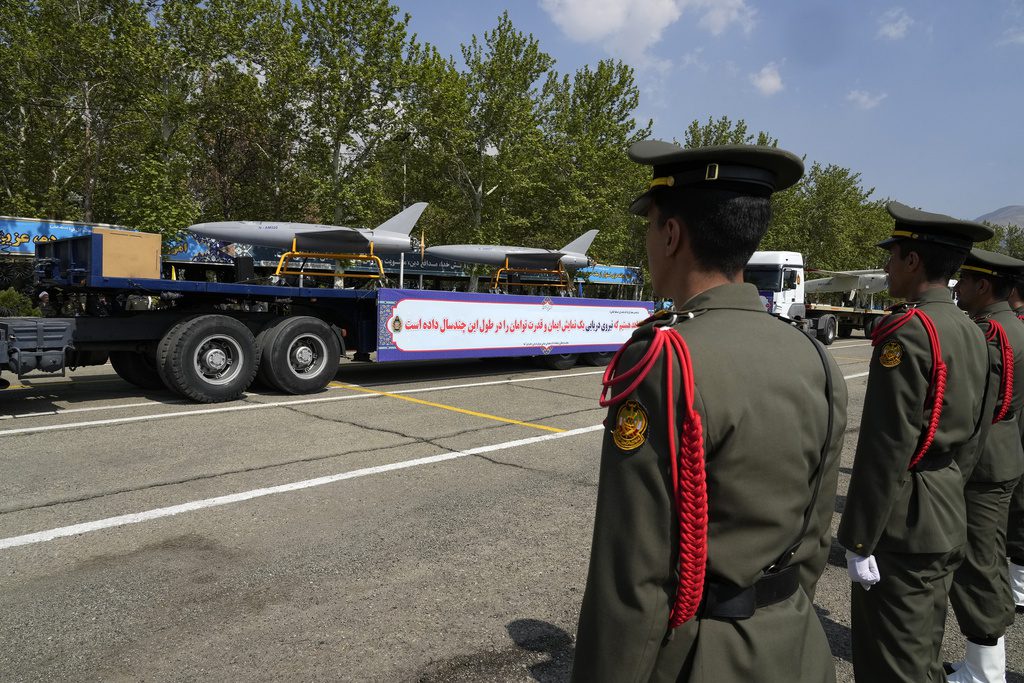A look back at 44 years of international sanctions against Iran, from the first after the 1980 US embassy hostage crisis in Tehran to those expected in the coming days after Iran’s unprecedented attack on Israel.
Iran’s economy, which has been hit hard by sanctions, is experiencing galloping inflation and seeing its currency, the rial, plummet. Supplies of medicines and medical equipment are particularly affected.
Freezing of assets
In April 1980, Washington embargoed consumer goods and froze $12 billion in Iranian assets following the major hostage taking at the US embassy in Tehran (November 4, 1979 to January 20, 1981).
US banned Iranian products
In early 1984, the US blacklists Iran as a state sponsor of terrorism for its alleged role in the Beirut attacks of October 23, 1983 (241 American soldiers were killed).
In October 1987, President Ronald Reagan banned imports of Iranian products and certain exports to Iran in response to Iranian attacks against US forces in the Gulf.
Full embargo
In June 1995, Bill Clinton orders a full trade embargo against Iran accused of supporting international terrorism.
The US Congress approves next year the “D’Amato” law which provides for retaliation against foreign companies that invest in the Iranian oil sector.
The UN against Iran’s nuclear program
In 2005, conservative Iranian President Mahmoud Ahmadinejad restarted the nuclear program.
Suspecting that Iran wants to acquire nuclear weapons, the UN announces a package of sanctions.
From 2006 to 2010, four resolutions imposed economic and trade sanctions on entities linked to Iran’s nuclear and ballistic missile programs, as well as freezing their assets and individuals.
To these are added the embargo on Iranian arms and restrictions on loans to Tehran.
Washington and Brussels continue
For its part, the United States banned in 2008 American banks from acting as intermediaries in the transit of funds with Iran. Between 2010 and 2012, retaliatory measures are announced against foreign groups investing in Iranian oil. The automotive sector is also being targeted.
The European Union bans in 2010 the provision of technical assistance or the transfer of oil technologies to Iran, freezes the assets of 243 Iranian entities in late 2011, imposes an oil embargo in early 2012, freezes the assets of Iran’s central bank, and then prohibits transactions between European and Iranian banks.
Removal of sanctions
In 2015, the landmark international agreement on Iran’s nuclear program aimed at ensuring that Iran does not acquire a nuclear weapon provides for the gradual lifting of sanctions imposed since 2006 related to the nuclear program.
Trump reinstates sanctions
In 2018, Donald Trump pulls the United States out of the agreement and reimposes severe economic sanctions. Tehran responds by gradually withdrawing from the agreement.
Europe is trying to circumvent new US sanctions with an exchange mechanism called Instex, which was first activated in March 2020 amid the first wave of Covid-19 to deliver medical equipment to Iran. But Instex failed to gain ground and was liquidated in 2023.
Biden negotiates but continues sanctions
Since Joe Biden’s arrival in the White House in early 2021, Washington has been indirectly negotiating with Iran to rejoin the deal. However, the president continues the policy of sanctions reacting to human rights violations, Iranian arms deliveries to Russia or cyber attacks.
Washington and Brussels have imposed bundles of sanctions following a bloody crackdown on protests following the September 2022 death of Mahsha Amini, who was arrested in Tehran by morality police.
In the spring of 2023, Britain, the European Union and the United States strengthened their sanctions against the Revolutionary Guards, Iran’s ideological army.
Imminent sanctions
The United States announced on Tuesday that it would step up sanctions against Iran within the next few days, following its attack on Israel on April 13, the first ever carried out from Iranian soil.
London and Brussels have also called for the sanctions to be expanded.
Read also:
Turkey: Foreign Minister Fidan accuses Netanyahu of wanting war in the Middle East to stay in power
Politico analysis: Ukraine is losing the war with Russia
Netanyahu: We will make our own decisions on Iran attack
#Iran #years #living #sanctions #West


